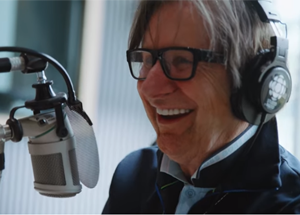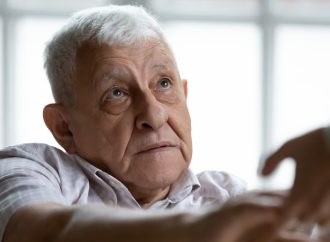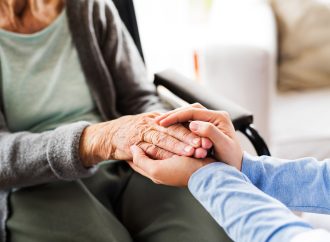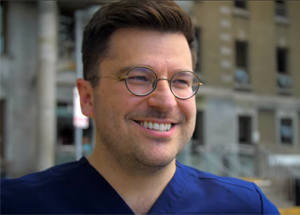Few medical students consider geriatrics as a possible career choice. It’s rarely the first field that comes to mind, especially during the first years of medical school. However, we are all aware that our population is aging, and with it comes an increasing need for physicians to care for our seniors. If you become a family doctor, you are bound to take care of elderly patients, which can be an intimidating population as most of them have an extensive past medical history with multiple comorbidities and chronic conditions to manage, but caring for the elderly can be a very rewarding and enriching practice. Première Ligne interviewed two amazing and inspiring family doctors working at the MUHC who have both developed a special interest in geriatrics over the years.
 Dr. Catherine Ferrier did her medical school and residency at McGill. She chose family medicine because she wanted a varied practice and a long term relationship with her patients. Towards the end of her residency, she was offered a position at the new Division of Geriatric Medicine at the Montreal General Hospital and has been working there ever since. Currently, she only does geriatrics, with a few primary care patients on the side. Here is a summary of her practice.
Dr. Catherine Ferrier did her medical school and residency at McGill. She chose family medicine because she wanted a varied practice and a long term relationship with her patients. Towards the end of her residency, she was offered a position at the new Division of Geriatric Medicine at the Montreal General Hospital and has been working there ever since. Currently, she only does geriatrics, with a few primary care patients on the side. Here is a summary of her practice.
Geriatric out-patient clinic and Memory clinic
Dr. Ferrier sees patients who are referred to the geriatric clinic for any reason related to advanced age, such as medical issues, impaired gait, polypharmacy, incontinence, etc. However, the vast majority of the patients she sees are referred because of impaired cognition to rule out a dementia, and if present, to treat and follow it. A complete assessment includes a good history of the cognitive problems and a thorough functional assessment (ADLs – ambulating, bathing, continence, dressing, eating – and IADLs – shopping, housekeeping, finances, cooking, taking medications, using the phone, transport), which are the most important elements. The assessment is followed by a mini-mental status exam (MMSE), a Montreal cognitive assessment (MoCA) when appropriate and a complete physical exam. Dementia is a clinical diagnosis, but one needs to exclude secondary causes; the dementia work-up therefore includes basic blood tests to rule out metabolic, endocrine or infectious causes with EKG, CXR and brain imaging when appropriate.
I love old people and people with dementia. They are often very vulnerable but are not always themselves aware of that fact, so they need particular attention.
Once the diagnosis is made, there are medications that can slow down the progression of the disease, like cholinesterase inhibitors such as Donepezil or Rivastigmine, or NMDA receptor antagonists, like Memantine. As with any chronic conditions, the patients need long-term follow-up, medication adjustments and management of side effects, which Dr. Ferrier does brilliantly.
Home visits
Dr. Ferrier has always done some of her patient assessments in the patient’s home, if for some reason they cannot or will not come to the clinic. She recently became the geriatric consultant for the CSSS Cavendish, which means that once a month she does assessments at home on patients who are referred to her.
Capacity assessments
About 12 years ago, she developed an interest in assessing decision-making capacity in patients with dementia and went to Toronto for a month to do a clinical traineeship with a well-known expert in the field. Since then, she does most of the capacity assessments that are referred to the MGH geriatric clinic.
Teaching
Furthermore, Dr. Ferrier has been responsible for coordinating the geriatrics clerkship rotation at the MUHC for the past ten years and is involved in teaching geriatrics to medical students.
We need to take our responsibilities very seriously: medicine is not just a way of earning a living; human lives depend on how we do our job. Keep learning throughout life and be willing to fight for your patients.
Challenges she encounters in her daily practice
- Patients who need protection because of cognitive problems, but who fight their family and refuse their doctor’s help because they have little insight into their condition and believe that the concerns voiced by their families and doctors are unjustified;‘‘These are the toughest patients to care for’’.
- Patient’s families who are seeking to satisfy their own needs rather than the patient’s needs and who will fight, even take each other to court, over these issues, especially when money is involved.
- Caring for patients waiting to be admitted on the ward, spending hours to days in the ER and having complications because of it, like deconditioning, delirium or hospital-acquired infections.
- Geriatric patients on other wards being neglected because of their age…it happens!
Dr. Paul Lysy did an undergraduate degree in Biological and Medical Science before entering medical school at the University of Toronto and completed his residency at Mcgill. After working in various emergency rooms, he opened his own solo practice in 1977. Family medicine appealed to him because of the long-term relationship with patients. His involvement in geriatrics goes back to the early 80’s when one of his patients moved into a small residence for old psychiatric patients because he was no longer able to look after himself.
It felt completely natural that I should just continue to look after him by visiting him at his home.
Eventually, he was looking after all 8 of the residents, started caring for elderly in other residences and eventually took over the in-patient geriatric unit at the old Queen Elizabeth Hospital. He then moved to the MGH when the QE closed. Here is a summary of his current practice.
Geriatric out-patient clinic and Memory clinic
Dr. Lysy spends 2 half days per week in the geriatric clinic, seeing patients referred for a variety of geriatric syndromes, especially cognitive decline.
Visiting patients in residence for the elderly
Every week, he will spend one day visiting patients in residences. It’s the same atmosphere as home visits, but he is able to see many patients during his day because the residents are all living in the same building so there is less time consumed on the road. Moreover, the nurses are very helpful and participate in organizing his schedule. He will start his day on the top floor of the residence, carrying the patient’s charts with him, going from rooms to rooms and down from floors to floors, seeing patients in their own apartments. Needless to say that the patient-physician relationships that develop are very strong.
There is something uplifting about living through end of life situations with patients and their families. The families are very important and I am full of admiration for the dedication and devotion and humanity that I have seen in my work.
Chronic care hospital
Dr. Lysy will spend one day per week taking care of 60 patients in a chronic care hospital.
Although there are many more geriatricians today, the majority of doctors looking after the elderly are still family doctors.
Office based practice
The rest of his time is dedicated to his solo practice. Although more than half of his patients are elderly, he still sees a number of teenagers and young adults in his office.
Teaching
Dr. Lysy has been involved in continuing medical education for many years, organizing courses in geriatrics and drug therapy for practicing physicians. He first began teaching family medicine residents when he ran the Geriatric Unit at the QEH. Currently, there are medical students with him about half the time in the geriatric clinic and during his residence visits. He is also involved in the Osler Fellowship and physician apprenticeship courses and will be involved in the new longitudinal family medicine experience this Fall.
Challenges he encounters in his daily practice
- Managing chronic illness.
- The emphasis on acute care in the healthcare system is a problem for patients who need rehabilitation or help at home.
- Adapting your pace to match your patient’s: ‘‘Working in geriatrics requires a somewhat different pace. After all, old people are usually not in a hurry.’’
- To communicate effectively in the context of hearing impairment, delirium and dementia.
Many thanks to Dr. Catherine Ferrier and Dr. Paul Lysy for sharing their experience and their enthusiasm with us!
For those of you wondering about the training necessary to practice in this field
After 2 years of family medicine residency, you can do a 3rd year fellowship in “Health care for the elderly” and become a family physician with special expertise in geriatrics. These doctors often work in primary care of older patients: home care, long-term care, clinics, etc. Many have a mixed practice, including care for the elderly as well as younger patients. Keep in mind that most family doctors practicing in the field have not done any additional training and have become experts over the years.
To become a geriatrician (a specialist), you need to complete 3 years of internal medicine residency and a geriatrics fellowship (of at least 2 years). These doctors usually work in an academic center and practice as consultants, teach, do research, etc.
I hope you enjoyed learning more about geriatrics as a variety of practice in family medicine!
 Natacha Kardous
Natacha Kardous
McGill University










